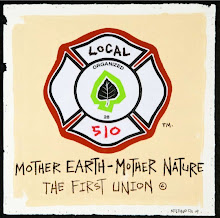http://www.streetroots.org/index.php- Portland
http://www.realchangenews.org/- Seattle
Weatherman blast survivor recalls turbulence and triumphs
by Joe Martin
http://en.wikipedia.org/wiki/Cathy_Wilkerson
http://www.kboo.fm/
Review: 'Flying Close to the Sun,' Cathy Wilkerson
BY SCOTT McLEMEE | Special to Newsday (warning: some denigrating sarcasm included!)
November 11, 2007
FLYING CLOSE TO THE SUN: My Life and Times as a Weatherman, by Cathy Wilkerson. Seven Stories Press, 422 pp., $ 26.95.
When Bill Ayers published "Fugitive Days" in 2001, his memoir of life as a leader of the Weather Underground received a lot of attention, as might be expected. But one commentary in particular went beyond the familiar bromides about '60s idealism, countercultural extremism, and the lure of violence. It appeared in Z Magazine, a leftish journal that usually manages to be both strident and soporific - though in this case the editors had a bit of luck, for they got hold of a review of Ayers by one of his peers from the Underground, ex-fugitive Cathy Wilkerson.
Wilkerson, who is now a schoolteacher in New York City, had survived when the pipe bombs her comrades were building in the basement of a Greenwich Village townhouse exploded one morning in March 1970. It was her father's townhouse; he was away on vacation. Three Weathermen died in the blast. Wilkerson and another woman crawled out of the rubble, contacted Weather's leaders, and disappeared into the American landscape, though their pictures were on "Wanted" posters everywhere. (She eventually turned herself in and did some prison time.)
Now Wilkerson has published her own account of the experiences and decisions leading to that terrible morning. The testimony is interesting in its own right, of course. But a couple of supplementary documents might have improved the book considerably - one of them being Wilkerson's review of "Fugitive Days," for her criticisms of that memoir provide some useful perspective on what she sought to do in telling her own story.
Ayers, she complained, treated the whole experience of radical activism in the 1960s as a kind of gonzo adventure: the product of revolutionary machismo, lacking much serious thought, let alone doubt or soul-searching. By contrast, "Flying Close to the Sun" seems alive to all the contradictions and questionable choices involved in Wilkerson's development.
To go from a proper Quaker upbringing to support for the civil rights movement was perhaps not such a huge step. But being arrested for the first time during a protest meant placing moral commitment ahead of middle-class mores. That was followed by another series of steps (uncertain, experimental, but necessary) as she tried to understand how opposition to racism and to the war in Vietnam might be part of the same struggle.
Then a few more steps - reading Franz Fanon and Regis Debray on the liberating potential of revolutionary violence, for example, and wondering whether it might ever apply in the United States. Before you know it, friends have created a bomb factory in your basement. But this does not happen overnight - and it involves really complicated and unstable combinations of deep seriousness and self-delusion.
"Ironically," Wilkerson writes about her state of mind in 1968, "having rejected my parents' belief that 'progress' would fix all, I was now tempted by a solution that was different in its particulars, but which shared a comforting veneer of certainty."
In "Fugitive Days," wrote Wilkerson in her review, Ayers treated the Weather members who died in the townhouse explosion as a cell out of touch with the West Coast leadership of the organization.
But in so doing, Wilkerson wrote, he failed to accept responsibility for his own role as leader - as someone who had upped the ante of violent rhetoric in the months preceding the blast, when the "Weather Bureau" (so the group's central committee was cutely known) issued apocalyptic calls for urban guerrillas to "bring the war home," in the organization's notorious slogan of the day.
Wilkerson's status within the group was that of a mid-level leader - not a member of the Weather Bureau, like Ayers, but an important functionary involved in organizing demonstrations and editing New Left Notes, the central publication of Students for a Democratic Society. In 1969, she wrote an important Weather document called "Towards a Revolutionary Women's Militia" (the other text I wish had been reprinted here) that certainly played its part in stoking the fires of paramilitary enthusiasm.
But that manifesto also criticized the Weather leadership's failure to confront the ideology of male supremacy. One of Wilkerson's recurrent points in "Flying Close to the Sun" is that a revitalized feminist consciousness had been growing steadily amid the civil rights and anti-war movements. This is well known to historians - but the popular understanding of the '60s tends to skip from Betty Friedan to bra-burning without considering how the idea of a "women's liberation movement" was influenced by discussions of "national liberation movements" in radical groups.
"Flying Close to the Sun" is valuable as an account of how these various currents intersected in one woman's experience - and how some of them led her to a place very far from the values she thought she was upholding.
"Now it seems fantastic," she writes, "that I responded to the clear signs of political idiocy by making the assumption that rational, responsible planning lay behind the wild proclamations." But this is does not mean that she blames the Weather Bureau. While rather more flatly written at times than "Fugitive Days," Wilkerson's memoir embodies a much more thoughtful engagement with questions of personal responsibility.
"Rather than listening closely to what people had said," she writes, "I tried to manipulate them into adopting the organization's current perspective, into carrying out the organization's wishes in order to protect my own standing. Rather than facing the complexity of problems, I had settled for simplistic solutions and for the fiction that we, the authors of those solutions, were somehow superior to those we sought to guide."
And that blindness led to disaster, to terror. If only people with far more bombs than Weather ever had would realize as much.
More articles
Copyright © 2007, Newsday Inc.
Sunday, December 2, 2007
More stuff and resources to tap into, and consider in these all out backlashing times...
Posted by
la fin du siècle
at
1:00 PM
![]()
Labels: The Fall of an Empire
Subscribe to:
Post Comments (Atom)





























No comments:
Post a Comment